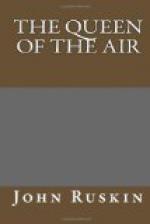139. Be that as it may, I am at present glad to be able to refer to one of these perpetuations, by his strong hand, of such human character as our faultless British constitution occasionally produces in out-of-the-way corners. It is among his illustrations of the Irish Rebellion, and represents the pillage and destruction of a gentleman’s house by the mob. They have made a heap in the drawing-room of the furniture and books, to set first fire to; and are tearing up the floor for its more easily kindled planks, the less busily-disposed meanwhile hacking round in rage, with axes, and smashing what they can with butt-ends of guns. I do not care to follow with words the ghastly truth of the picture into its detail; but the most expressive incident of the whole, and the one immediately to my purpose, is this, that one fellow has sat himself at the piano, on which, hitting down fiercely with his clenched fists, he plays, grinning, such tune as may be so producible, to which melody two of his companions, flourishing knotted sticks, dance, after their manner, on the top of the instrument.
140. I think we have in this conception as perfect an instance as we require of the lowest supposable phase of immodest or licentious art in music; the “inner consciousness of good” being dim, even in the musician and his audience, and wholly unsympathized with, and unacknowledged by the Delphian, Vestal, and all other prophetic and cosmic powers. This represented scene came into my mind suddenly one evening, a few weeks ago, in contrast with another which I was watching in its reality; namely, a group of gentle school-girls, leaning over Mr. Charles Halle, as he was playing a variation on “Home, Sweet Home.” They had sustained with unwonted courage the glance of subdued indignation with which, having just closed a rippling melody of Sebastian Bach’s (much like what one might fancy the singing of nightingales would be if they fed on honey instead of flies), he turned to the slight, popular air. But they had their own associations with it, and besought for, and obtained it, and pressed close, at first, in vain, to see what no glance could follow, the traversing of the fingers. They soon thought no more of seeing. The wet eyes, round-open, and the little scarlet upper lips, lifted, and drawn slightly together, in passionate glow of utter wonder, became picture-like, porcelain-like, in motionless joy, as the sweet multitude of low notes fell, in their timely infinities, like summer rain. Only La Robbia himself (nor even he, unless with tenderer use of color than is usual in his work) could have rendered some image of that listening.




